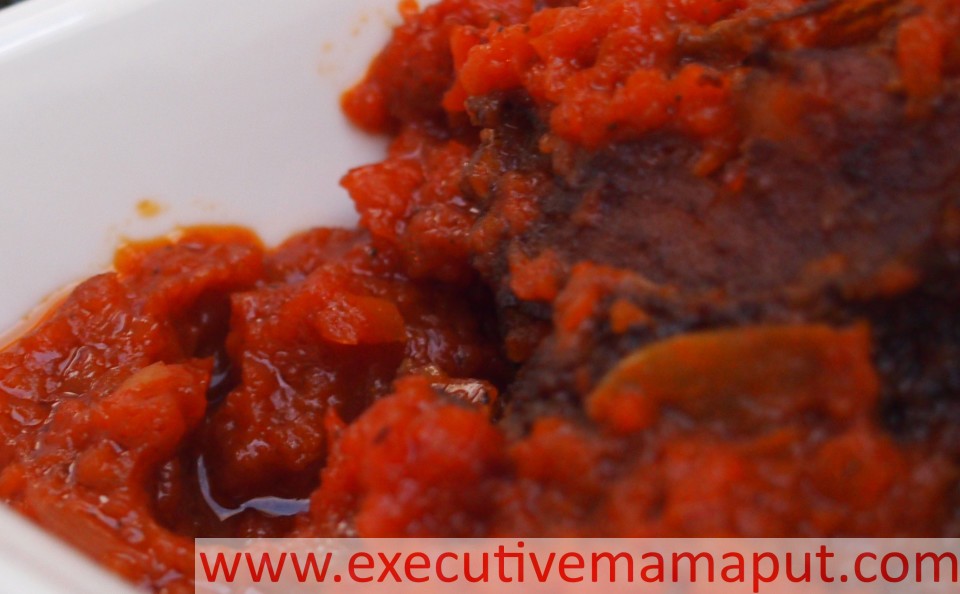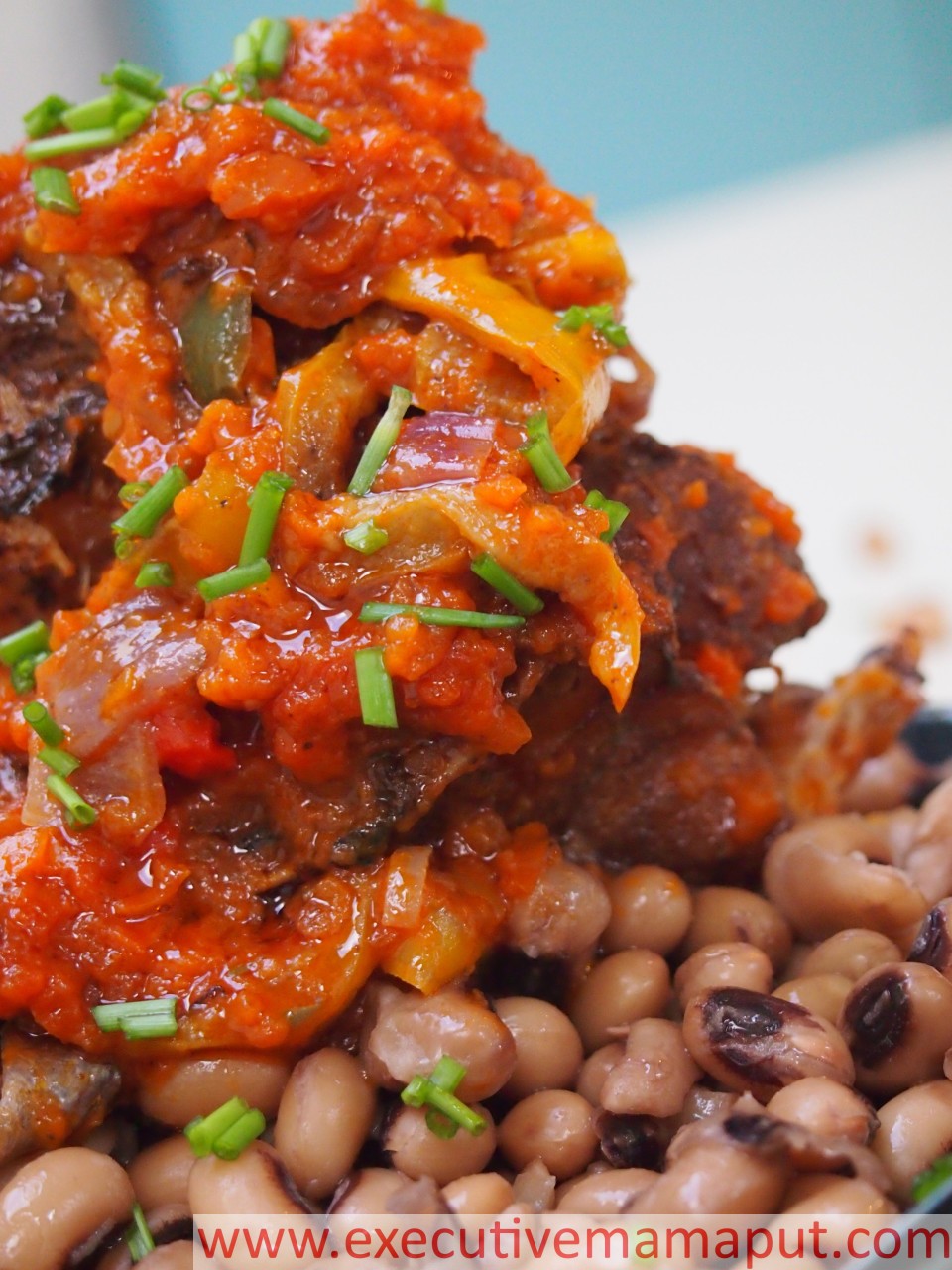Many people (Nigerians included) feel that Nigerian food is hard to cook and takes a long time to prepare. Whilst this is true to some extent, particularly as regards the preparation, there are several ways of getting around this.
Master two key basics (a good stock) and a good tomato stew (sauce) and you are on your way to mastering the Art of Nigerian Cooking. These two form the basis of many dishes.
Stock: below is a recipe for meat stock; Nigerians tend to be big meat eaters and feel that a meal is not complete without a variety of meat. This is slowly changing as people become aware of the health benefits of eating less meat. I make fish stock using fish bones, seafood shells; and stockfish bones and trimmings.

- 1kg oxtail
- 1kg stewing beef
- 1kg boiling chicken
- 2L water
- 500g - 1kg stockfish (washed and soaked overnight, or for several hours)
- 2 tablespoons crayfish, finely ground
- *3 onions, about 400g (peeled and quartered, optional)
- *200g tomatoes (optional)
- 1 -2 Scotch bonnet chillies, about 16g
- 1 - 2 teaspoons Cameroon pepper (optional)
- Wash and prepare the meat, trimming off any excess fat.
- Liquidise the onions, crayfish, chilli, stock cubes and tomatoes and Cameroon pepper (if using) with a small amount of water.
- Place the meat in a large saucepan, layering them according to how quickly they cook: oxtail, stockfish, stewing beef, then chicken (in this case), pouring some of the liquidised mixture over each layer. Note that stockfish becomes gelatinous as it cooks and may ‘catch’ the bottom of the pot which is why I prefer to place it on top of the oxtail.
- Add the water, and bring to a fast boil for about 10 minutes. Turn down the heat and simmer for about an hour or so, until the meat and stockfish is tender but not too soft.
- Once it has cooled down, remove the bones and skin from the stockfish. These may be boiled up with onions and chilli to make stockfish stock, or discarded.
- Divide the meat, stockfish and stock into 3 - 4 containers, suitable for freezing.
Red bell peppers may be used as a substitute for tomatoes if you are not cooking these soups.
This will provide enough meat/stock for 3 - 4 pots of soup depending on how meaty you like your soups!
Tomato Sauce aka “Stew”. That’s what we call it: “Stew!”. It may be a sauce or a salsa to the rest of the world; we call it “stew”. Verbose though we may be with certain things, when it comes to food, we are perfunctory. – our bean casserole in English is known as “beans”. We don’t have fancy names for any of our dishes, they are all purely functional – okra soup (actually, a casserole, but that’s another story) is exactly “what it says on the tin”; rice means boiled rice – jollof or fried, if you would like something more fancy; and so on!
On a more poetic, or shall I say, a more sophisticated, note, just like the ‘sofrito’ and ‘mirepoix’ of Latin and French cuisines form the basis of many delicious dishes, so does the Nigerian “stew”; a blend of onions, chillies and tomatoes. Everyone has their own way of making it, with the proportions of each of the trio dependent upon personal taste. I sometimes substitute all or some of the tomatoes with red bell peppers if I want a slightly sweeter sofrito (or stew!). My favourite way (and most appreciated by others) of making stew is “Uncle Benson’s Warri Stew”. This is a particular favourite of No 1 daughter and my cousin, Nneka E. I still have memories of having to make it every day for a week .. you would have thought I would have learnt not to ask “what shall I make for supper today?” So that’s my family, I didn’t think much of it until I made it for a friend, Dr Ike … and his text message, barely minutes after I had delivered it is probably my most favourite feedback ever. He’s also a brilliant writer, but more of that at some point (I have some amazing friends). So here it is.
Back to stew, here’s a recipe for Uncle Benson’s Warri Stew. Other variations will follow in due course. Why Uncle Benson’s Warri Stew? He’s my friend Chinwe’s husband and when I mentioned yonks ago that I was writing a Nigerian cookbook, he said I must include Warri Stew.

- 2 red bell peppers, (about 550g), seeded and quartered
- 1 large onion (about 200g), peeled and quartered
- 1 small onion (about 60g), peeled and thickly sliced
- 1 Scotch Bonnet chilli, about 8g (or to taste, optional)
- 4 tablespoons tomato puree
- Salt to taste
- 1 teaspoon fresh thyme
- 300ml groundnut or other vegetable oil
- Using the ‘pulse’ function, liquidise the bell peppers, quartered onions and chilli with little or no water and set aside. The mixture should be fairly chunky.
- Place the oil and sliced onions in a large pan and fry until the onions turn black. Remove and discard them. Turn down the heat and fry the tomato puree for a minute or so and then add the thyme and liquidised vegetables.
- Continue to fry the stew on a low to medium heat for about 20-30 minutes and the mixture is reduced. You will know it is ready when the oil floats to the top. Any additions such as cooked/fried meat, fish or chicken should be made now. Cook for a further 5 - 10 minutes to heat them through.
- Drain the oil and serve with serve with boiled yam; boiled rice; boiled beans; or bread.
This also makes a great sauce for pizza and pasta.
Additions:
1kg boiled or fried meat, fish or chicken
Variations:
Add one or two teaspoons of curry powder at the same time as the liquidised vegetables.
What I love about stew is how versatile it is: you can add pretty much anything to the basic sauce in terms of flavourings, spices, meat, fish, seafood and vegetables.
Here I added some grilled fish, chopped onions and red peppers, served with boiled honey beans.

